Floating in the Dead Sea is often described as a surreal, otherworldly experience. And for me as a first timer visiting Jordan, it was everything. Unlike anything I’d ever felt before. I have known about the Dead Sea from reading the Bible, and have seen travelers add this to their bucket list when they visited Jordan and Israel in the Middle East. And to this date, this has been one of my favourite travel experiences in the world.
In this post, I’ll walk you through exactly what it’s like to float in the Dead Sea, and how you can better prepare for your first Dead Sea floating experience.

Table of Contents
Floating in the Dead Sea: What is the Dead Sea and Why is it Unique?
The Dead Sea, bordered by Jordan to the east and Israel and Palestine to the west, is a hypersaline lake located at the lowest point on Earth—about 430 meters (1,410 feet) below sea level. Its salinity level is over 30%, almost ten times saltier than ocean water. This extreme salt concentration makes it impossible for aquatic life to thrive—hence the name “Dead Sea.”
But the salt content also creates a rare natural phenomenon: natural buoyancy. You can float effortlessly on the surface without any swimming skills. It’s almost like lying on a waterbed made of warm, silky minerals.
My First Time Floating in the Dead Sea: A Surreal Experience
Before my trip to Jordan, I had seen pictures and videos of people floating in the Dead Sea, but nothing prepared me for the actual feeling. As I stepped into the warm water at the access point at the Kempinski Ishtar resort, I immediately noticed the difference in texture. The water felt thick and oily due to the high mineral content.
Once I waded in waist-deep, I slowly leaned back—and just like that, I was floating! It was effortless, strange, and oddly peaceful. At first, a part of me still felt a bit of unrest: I felt like the water was going to “go with me”! In a way, the sensation is hard to describe: you know you can float, but because this type of water feels like unusual territory, you are also a bit skeptical. And the thing is, you have to make sure that you don’t taste or swallow any of the water (like it could accidentally happen when you are swimming in regular seas). This is because the salinity is so high that after tasting extremely salty, it tastes bitter and it is quite an unpleasant feeling to get rid of.
While I floated, my body felt supported, cradled by the dense water. It was an amazing feeling of suspension, like hovering in space. But… in water.
What to Know Before You Go Floating in the Dead Sea
Floating in the Dead Sea isn’t like visiting any other beach or lake. There are specific precautions and tips to ensure a safe and comfortable experience. I am glad I knew them beforehand so I could avoid the disagreeable surprises. And now, I am sharing this with you so you can feel prepared for your first experience floating in the Dead Sea!
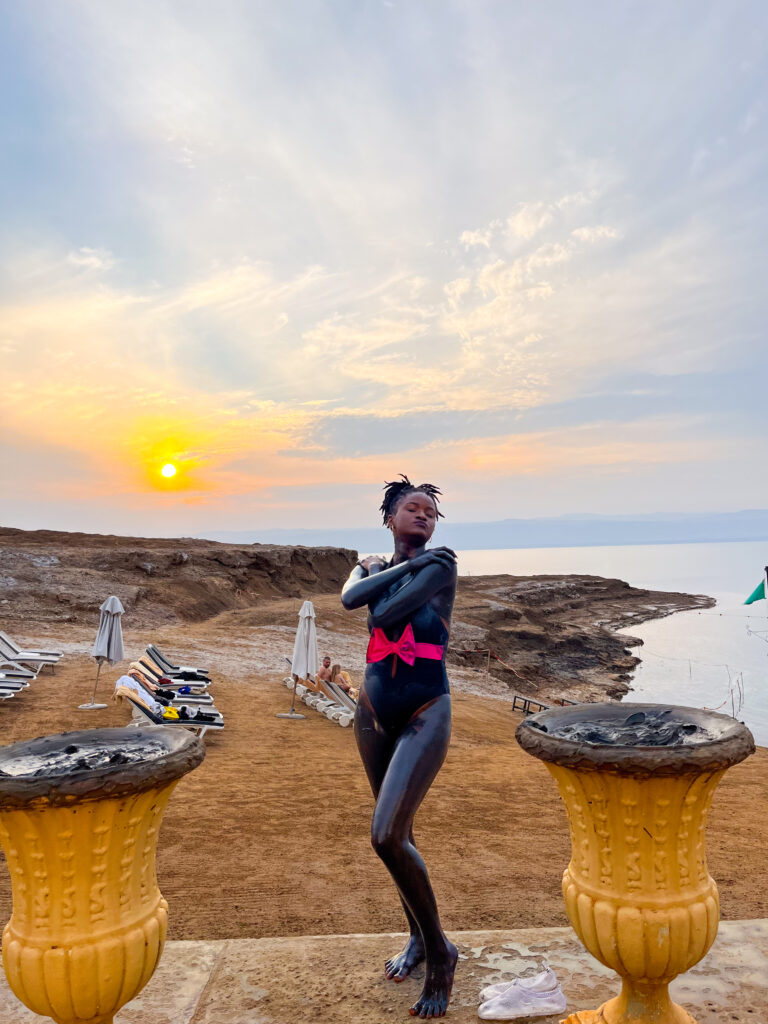
1. Don’t Shave or Wax Beforehand
The salt can irritate any small cuts or freshly shaved skin. If you do, it stings.
2. Avoid Getting Water in Your Eyes
Dead Sea water in your eyes is extremely painful. Be careful not to splash, and avoid dunking your head. If it happens, rinse immediately with fresh water. At the Kempinski Ishtar Resort access point, there is a rinsing station where you can rinse off the sea water with fresh water.
3. Wear Water Shoes
The salt crystals and rocks at the bottom of the sea can be sharp. Water shoes protect your feet and make it easier to walk on the slippery surfaces. I did not need to bring any, as I got some at the rinsing station at my resort. This is yet another reason why you should book a stay at the Kempinski Ishtar, if you were looking for a place to spend the night in the area.
4. Only Float for 10-15 Minutes
It truly feels relaxing and peaceful, but do not stay more than 15 minutes at a time. Staying in too long can dehydrate your skin. With the skin being the largest organ of the human body, if it gets dehydrated, then you get dehydrated and you would then need to adjust your internal water balance. After floating, rinse off with fresh water at the rinsing station and… do a full body Dead Sea Mud Mask!
5. Embrace the (Dead Sea) Mud!
You can’t have a complete experience Floating in the Dead Sea without a Dead Sea Mud Mask! The Dead Sea is full of minerals that are very good to purify and detoxify your skin – essentially, you are giving yourself a free spa day. Apply the mud mask evenly through your entire body, let it sit for 3-5 minutes and rinse it off. And voila, you will feel brand new!
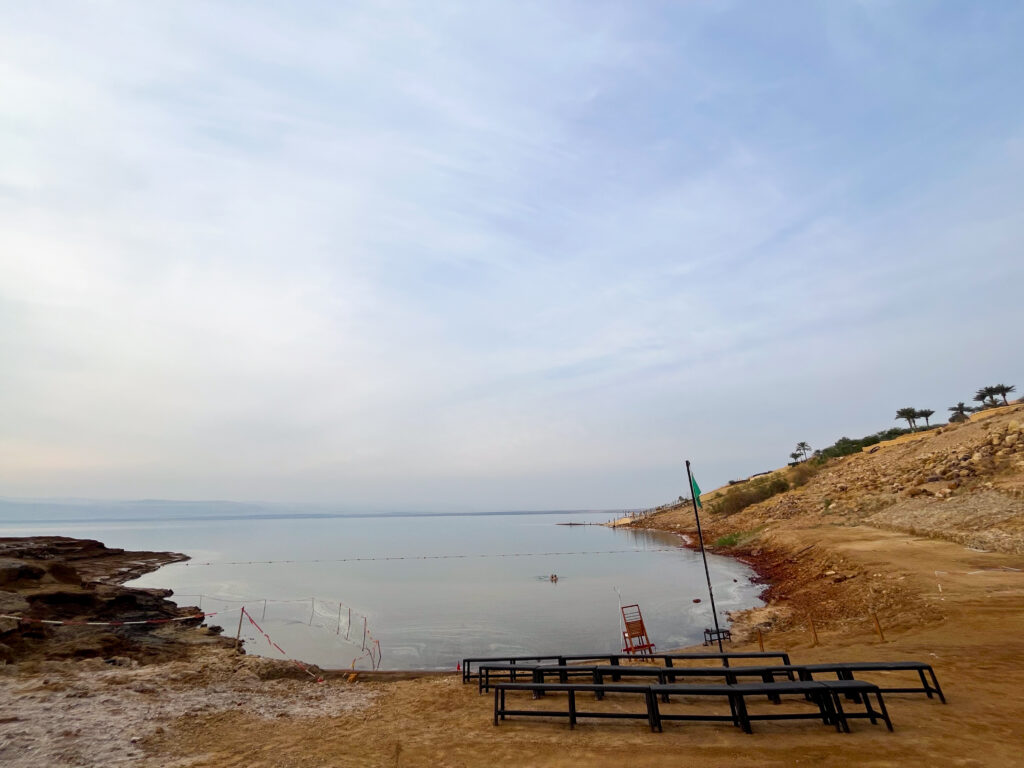
Best Places to Float in the Dead Sea (Jordan Side)
If you’re traveling through Jordan, here are a few popular access points for floating:
- Dead Sea Resort Area (Sweimeh): this area is home to luxurious resorts like the Mövenpick, Hilton, and Kempinski, which all have private beaches and fresh-water showers. I stayed at the Kempinski Ishtar Luxury Resort to enjoy this experience, and I am grateful I did. I had a free shuttle from my hotel to the Dead Sea access point (a short 3 minute drive), and I could call the shuttle to pick me up and drop me back at the hotel if I did not want to walk. Another great perk is the fact that the resort staff is there to assist you in any way you want (either in applying the mud mask, or in packaging some of it, as well as some sea salt for you to take away).
But if you want to consider other options, here are some to keep in mind:
- Amman Beach: this is a more budget-friendly public beach with facilities and mud stations.
- Dead Sea Panorama Complex: this area is not for floating, but a fantastic viewpoint and educational experience to learn about the geology and history of the Dead Sea.
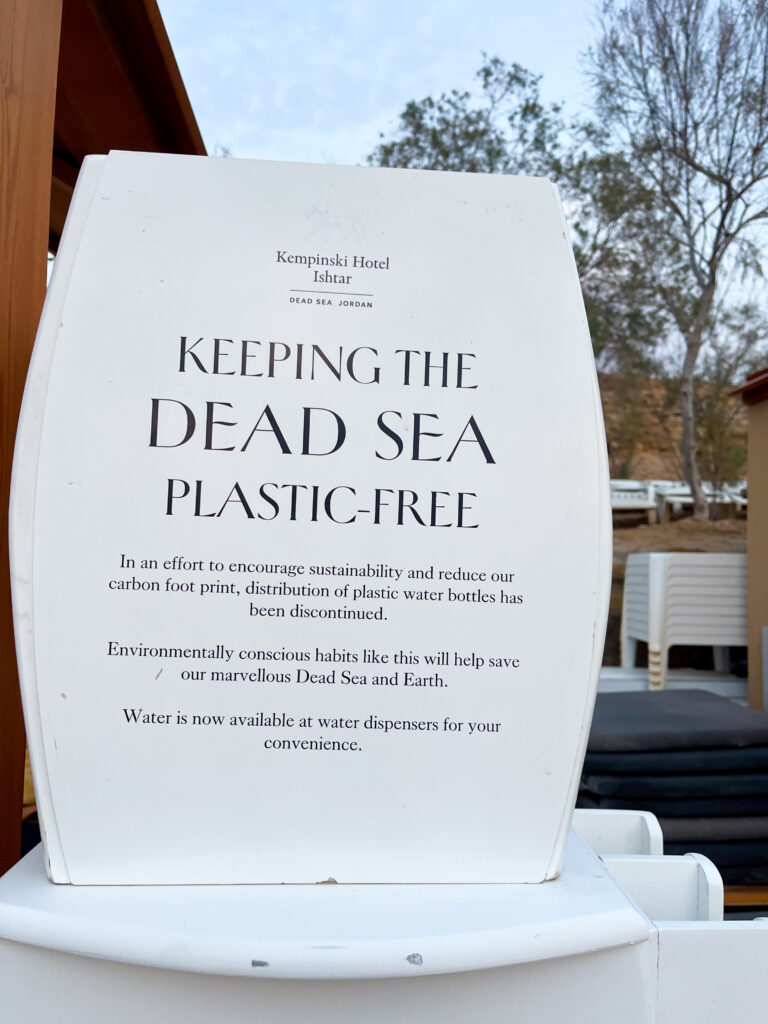
Health and Wellness Benefits of Floating in the Dead Sea
From biblical times and perhaps time immemorial, people have flocked to the Dead Sea for its therapeutic properties. Here are a few ways in which a good soak (or float) in the dead sea help with your body health:
- Floating in the Dead Sea is good for skin conditions: the minerals (especially magnesium and bromide) can help with skin conditions such as rashes, psoriasis, eczema, and acne.
- Floating in the Dead Sea can help with arthritis relief: The high-density water of the Dead Sea reduces stress on joints, and the mud helps soothe inflammation.
- Floating in the Dead Sea can help improve breathing: The air near the Dead Sea is oxygen-rich and low in allergens, which is why it could be helpful for people with asthma.
And even if you are not having a floating in the Dead Sea experience for a health reason, your skin will feel baby-smooth after a float and mud bath.

When Is the Best Time to Visit the Dead Sea?
The best time to visit is during spring (March to May) and fall (September to November) when temperatures are warm but not scorching. Summer can reach over 40°C (104°F), and winter might be too cool for swimming, although still pleasant for sightseeing.
Packing List for Floating in the Dead Sea
I took my bathing suits and sandals for my floating in the Dead Sea experience. And since I stayed at the Kempinski Ishtar resort, I received towels and water shoes for this experience. But if you feel the need to pack additional items (based on where you decide to go floating in the Dead Sea), here are a few useful items you should consider:
- Bathing suit (preferably dark-colored; salt may stain light fabrics)
- Water shoes
- Towel
- Flip-flops (to return to your hotel, as the water shoes might be uncomfortable to walk in)
- Sunscreen if you go before sunset (reef-safe)
- Moisturizer for aftercare (unless you get some at your hotel)
- Camera or phone (for those floating shots!)
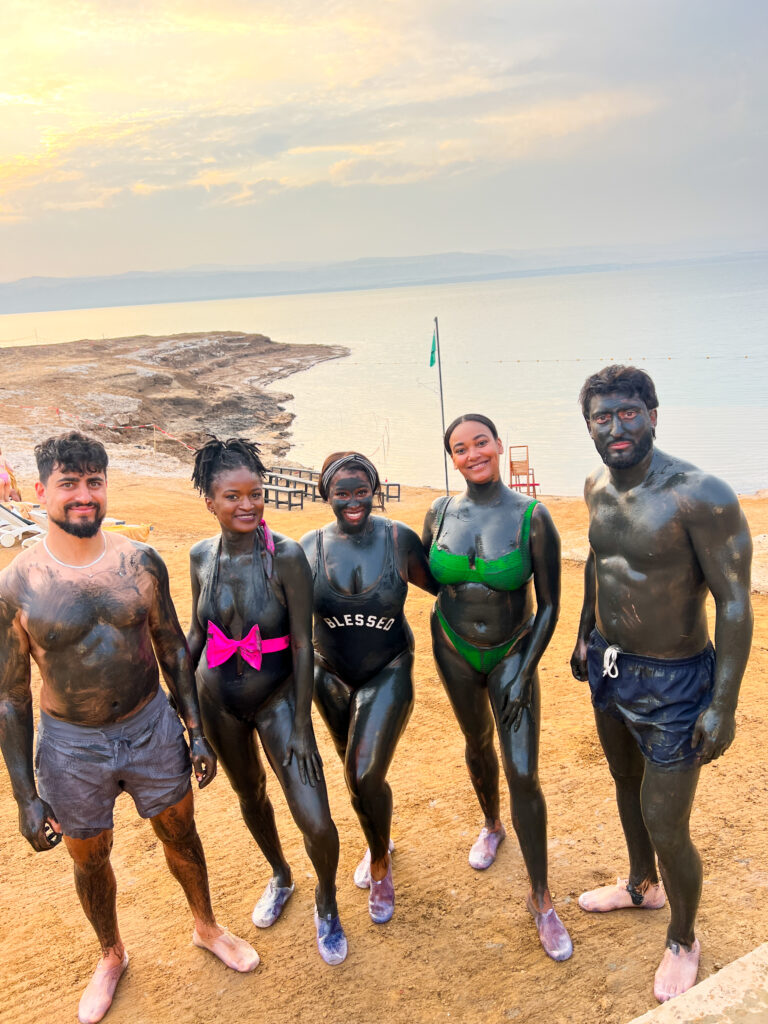
Final Thoughts: Is Floating in the Dead Sea Worth It?
Absolutely. Floating in the Dead Sea is one of those bucket list experiences that lives up to the hype. I could not leave Jordan without having this experience, and I am extremely grateful that I did. It’s relaxing, healing, and makes you feel like you’re defying gravity. Whether you do it from the Jordanian or Israeli side, it’s an unforgettable encounter with nature’s magic.
If you’re planning a trip to the Middle East, carve out a day to float in the Dead Sea. Just remember to come prepared and respect the environment. Your body—and your Instagram feed—will thank you.
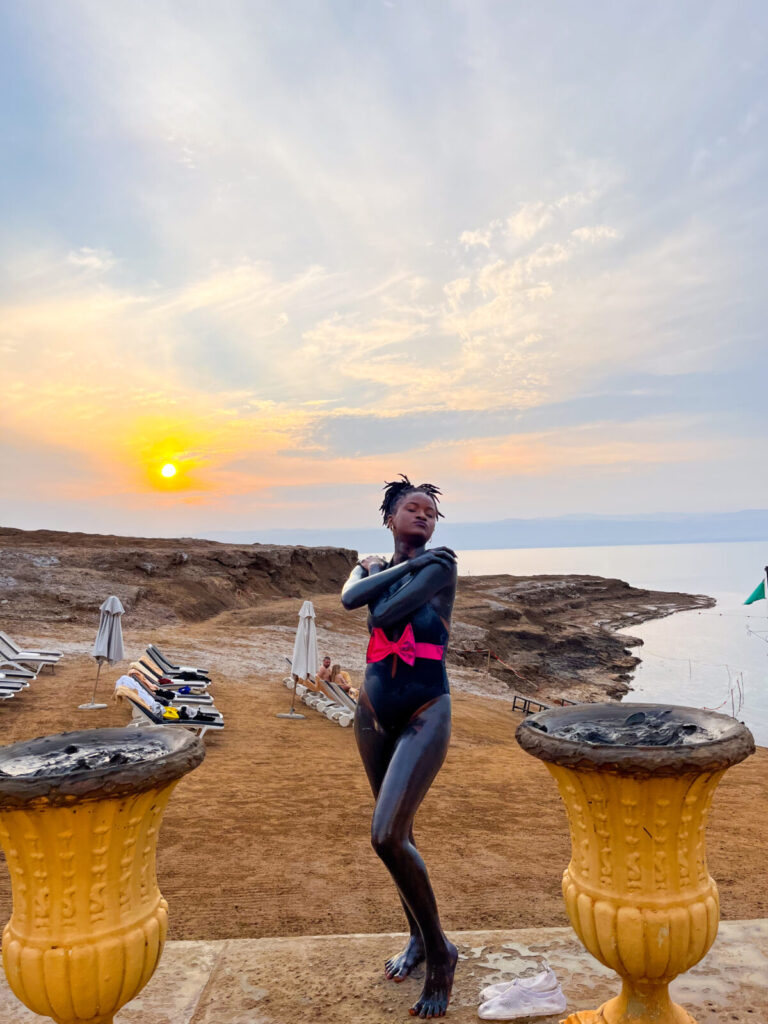
Leave a Reply